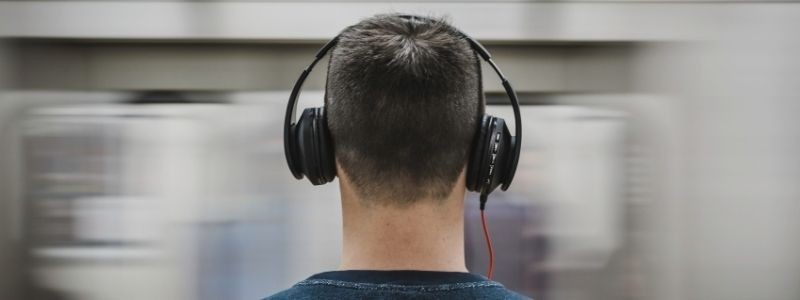
Head of Customer Content Experience

Audiology Expert & Founder

International Noise Awareness Day 2024
Understanding the dangers of loud noise and hearing loss
International Noise Awareness Day 2024, Wednesday 24th April 2024
#INAD2024 #NoiseHurts #InternationalNoiseAwarenessDay
International Noise Awareness Day is an annual event held on the last Wednesday of April that aims to raise awareness about the detrimental effects of noise pollution on individuals and communities. This global initiative seeks to promote understanding of the health, environmental, and social consequences of excessive noise exposure.
International Noise Awareness Day encourages individuals to take action by promoting quieter environments, implementing noise reduction strategies, and raising awareness about the importance of sound management.
How does loud noise cause hearing loss?
Loud noise is very harmful to the inner ear or cochlea. It could be a one-off exposure to severely loud sounds or listening to loud sounds for a long period of time - either way, it can result in hearing loss.
Loud noise can damage your nerves, membranes, hair cells, or other parts of your ear. This can cause temporary or permanent hearing loss. Learn more about how this happens, so that you can take action to prevent hearing loss and tinnitus (ringing in your ears).
What happens to your hearing when you are exposed to loud music?
Have you ever experienced muffled hearing after being exposed to loud music, like a concert? You might have been left with ringing in your ears and these are the first signs of hearing damage. The reality is that the music or sound was too loud for your ears to cope with.
Hearing loss is either temporary or permanent. Permanent hearing loss is a result of too much damage to vital parts of your ear. However, generally, the muffled sound and tinnitus symptoms are temporary and will clear up in a few days.
This is possible because your hair cells mirror the shape of blades of grass and they bend more if the sound you hear is louder than normal. Soon after they recover and straighten out again. Although regular exposure to loud music can be detrimental to your hearing long-term.
How does loud noise cause hearing loss?
Your ears are extremely delicate and when sound vibrations reach your eardrum they make your eardrum vibrate. Within your middle ear, there are three small bones, and as your eardrum vibrates these three bones pick up and amplify the vibration and transmit it to your inner ear.
This is where your cochlea is, which contains fluid and thousands of microscopic hair cells. In fact, on average, we have around 16,000 hair cells here. These tiny hair cells are responsible for converting our sounds. The vibration ripples the fluid in the cochlea and this instigates the movement of your hair cells.
This, in turn, creates electrical signals which are sent to your auditory nerve and then your brain. Finally, your brain turns these signals into sounds that you recognise and hear, so you can enjoy sound, speech, and music.
Noise exposure generally damages the hair cells at the bottom of the cochlea which can cause high-frequency hearing loss, which ultimately has a huge impact on our ability to understand conversations.

International Noise Awareness Day 2024
How loud is too loud? Notes on noise-induced hearing loss
Loud music affects on hearing loss - How can loud noise cause hearing loss?
If the sounds you hear are louder, the vibrations increase, which makes the fluid move more quickly. If the hair cells move too fast they can break or bend. These hair cells cannot repair themselves or grow back. This means that if they are damaged due to exposure to loud sounds they cannot transmit sound properly.
It is important to remember that it isn't just the hair cells that are at risk from loud music exposure. A sporadic sound like heavy drumming can create strong vibrations in the ear that can perforate your eardrum. There is a chance that the perforation will heal by itself, but will not work as successfully as it did before the damage.
In some cases, the bones in the middle ear can start to shake so violently that they can crack or even break. When this happens, the damage is irreversible and will cause hearing loss. In addition, and just like damaged hair cells, exposure to loud noise can also damage your auditory nerve. This nerve transmits important information to your brain.
Loud music hearing loss statistics and perspectives:
- MP3 volume limit 90dB
- Concerts can reach 100dB
- Nightclubs can reach 95dB
- Sounds over 85 decibels can damage your hearing
- 17% of adults suffer from hearing loss due to excessive exposure to noise
You can roughly have between 30-50% of hair cell damage before it alters your hearing
It will happen slowly, and over time, more and more hair cells will become damaged. Generally, this process is so gradual that you will not realise it at first, but the more you listen to loud music for a long period of time - the quicker it will cause hearing loss.
We understand that in some listening situations, you may need to turn up the volume of your favourite TV shows, but it is important to remember that as we get older naturally our hair cells die off. This results in many people needing hearing aids as they get older.
To put hair cell damage into perspective, if you have few good hair cells left to begin with, the reduction in your hearing will deteriorate quicker.

International Noise Awareness Day 2024
Listening to music safely is a good place to start
Listening to loud music and hearing loss preventatives
How can you reduce the risk of induced hearing loss? One of the main preventative for events such as festivals and live concerts is wearing earplugs or ear defenders when you are near a stage and, therefore, close to speakers. By doing this, you are reducing the loud sounds going into your ear, making it quieter and safer. Try and stay away from speakers if you can.
Also, if you take regular breaks, where you are away from the stage, it gives your ears a much-needed rest from the exposure to loud noises. Five minutes every hour is advised and there are now chill-out areas at most gigs and live events for this purpose.
Loud music and headphones hearing loss preventatives
When you are listening to music through your headphones, avoid listening at maximum volume. If people can hear the music, then the volume is too loud. For example, if someone is standing around two feet away from you and can still hear the music - you are at serious risk of hearing damage.
A lot of people turn up the volume of their speakers because they can still hear background noise or outside noise. Invest in noise-cancelling headphones so you can enjoy your music at a safe volume without the distraction of background noise.
Most phones and listening devices have safe volume levels, so if the music or podcast is too loud the volume display turns red. Don't go over this red threshold - it is there to keep you safe and protect your hearing.
Noise-induced hearing loss (NIHL)
This is a prevalent yet preventable condition that results from prolonged exposure to excessively loud sounds, causing damage to the delicate structures within the inner ear. This form of hearing impairment is a cumulative process, gradually developing over time as the sensory cells in the cochlea become damaged or destroyed.
While temporary exposure to loud noises can lead to temporary hearing disturbances, prolonged or repeated exposure to high-intensity sounds can result in irreversible and permanent damage to the auditory system.
Causes of noise-induced hearing loss
Noise-induced hearing loss can be caused by various sources, including occupational environments with high levels of noise, recreational activities such as attending loud concerts, using firearms, or exposure to loud music through personal listening devices. Individuals working in construction, manufacturing, mining, and entertainment industries are particularly vulnerable to this condition.
The intensity of sound is measured in decibels (dB), and prolonged exposure to sounds above 85 dB can pose a significant risk to hearing. The risk increases exponentially with the intensity and duration of exposure.
The mechanisms of noise-induced hearing loss involve the gradual degradation of the hair cells and auditory nerve fibers in the inner ear. When exposed to loud sounds, the sensitive hair cells become overstimulated, leading to their fatigue and eventual damage. Over time, this damage accumulates, leading to a diminished ability to perceive and process sound signals.
Symptoms of noise-induced hearing loss and how to prevent it
The initial symptoms of noise-induced hearing loss may include difficulty understanding speech in noisy environments, a persistent ringing sensation known as tinnitus, or a sense of fullness in the ears.
Preventive measures play a crucial role in reducing the incidence of noise-induced hearing loss. Implementing engineering controls and using personal protective equipment, such as earplugs or earmuffs, can help mitigate the risks associated with high noise levels.
Education regarding the dangers of excessive noise exposure and the importance of taking precautionary measures is essential in preventing the onset of noise-induced hearing loss. Regular hearing screenings can aid in the early detection of any impairment and prompt intervention.
Is there a cure for noise-induced hearing loss?
While there is currently no cure for noise-induced hearing loss, various management strategies can help individuals cope with the condition. These may include the use of hearing aids or assistive listening devices to enhance sound perception. Rehabilitation programs, including auditory training and counselling, can also assist in improving communication skills and enhancing the quality of life for individuals affected by this condition.
Noise-induced hearing loss is a preventable yet pervasive condition that can significantly impact an individual's quality of life. By raising awareness, implementing preventive measures, and encouraging regular hearing screenings, the incidence of noise-induced hearing loss can be minimised, thus preserving the precious gift of hearing for generations to come.
In conclusion
Prolonged exposure to loud sound can have a huge impact on your hearing health and well-being. If you are experiencing muffled hearing for a prolonged duration, you must see a professional - either your GP or local audiologist.
They will check your ability to hear and whether you are suffering from any hearing loss or permanent hearing damage using a hearing test audiogram. If needed, they will advise on the right treatment going forward.
Why Choose Us?
- FREE Hearing Tests
- Best Hearing Aids and Prices
- FREE Aftercare for Life
- FREE Home Visits
- 200+ Local Audiologists
- 60 Day Money Back Guarantee
Noise Awareness Day 2024
If you are looking for some support regarding hearing loss, hearing aids or you are searching for a local audiologist and a hearing test - please call us free on 0800 567 7621 to speak with one of our experts.
Read Next:
►How artificial intelligence in hearing aids can help your hearing
What's included in our hearing aid prices?
Our specialist service includes:
Do not spend hundreds of pounds without getting a second opinion from us.
Please call us on 0800 567 7621
 Not only are the prices great, but the service is fantastic! Many thanks to your team.
Not only are the prices great, but the service is fantastic! Many thanks to your team.Watch our video about our hearing healthcare services below
Other pages you might find useful
Common FAQs when researching hearing aids and hearing loss
If you are looking at this page then it is likely that an audiologist has suggested that you purchase this particular hearing aid, so is this the best model for you?
In general, any audiologist will always be recommending to you the model that best suits your needs. Here is a useful check list to make sure that is the case.
- Audiologist level of knowledge. The audiologist you have seen will hopefully have a wide knowledge of all available hearing aids, however some will only be familiar with a small number of brands and therefore may not really be in a position to know which model is the best for you. It is OK to challenge their recommendation and ask them to justify why this particular brand is the one for you.
- Do research. Read about the hearing aid that was recommended. Does it seem like it will suit your lifestyle? Does it have more or less features than you need?
- Be aware of sales targets. Many high street retailers have specific tie-ins to a particular manufacturer/brand. The hearing aid they have suggested may still be the correct one for you, but do your research so that you know why they might have recommended it.
If in doubt, feel free to give us a call. That's what we're here for.
If you have a significant hearing loss in both ears, you should be wearing two hearing aids. Here are the audiological reasons why:
Localisation. The brain decodes information from both ears and compares and contrasts them. By analysing the miniscule time delays as well as the difference in loudness of each sound reaching the ears, the person is able to accurately locate a sound source. Simply put, if you have better hearing on one side than the other, you can't accurately tell what direction sounds are coming from.
Less amplification required. A phenomena known as “binaural summation” means that the hearing aids can be set at a lower and more natural volume setting than than if you wore only one hearing aid.
Head shadow effect. High frequencies, the part of your hearing that gives clarity and meaning to speech sounds, cannot bend around your head. Only low frequencies can. Therefore if someone is talking on your unaided side you are likely to hear that they are speaking, but be unable to tell what they have said.
Noise reduction. The brain has it’s own built in noise reduction which is only really effective when it is receiving information from both ears. If only one ear is aided, even with the best hearing aid in the world, it will be difficult for you to hear in background noise as your brain is trying to retain all of the sounds (including background noise) rather than filtering it out.
Sound quality. We are designed to hear in stereo. Only hearing from one side sounds a lot less natural to us.
For most people, the main benefit of a rechargeable hearing aid is simple convenience. We are used to plugging in our phones and other devices overnight for them to charge up.
For anybody with poor dexterity or issues with their fingers, having a rechargeable aid makes a huge difference as normal hearing aid batteries are quite small and some people find them fiddly to change.
One downside is that if you forget to charge your hearing aid, then it is a problem that can't be instantly fixed. For most a 30 minute charge will get you at least two or three hours of hearing, but if you are the type of person who is likely to forget to plug them in regularly then you're probably better off with standard batteries.
Rechargeable aids are also a little bit bigger and are only available in behind the ear models.
Finally, just like with a mobile phone, the amount of charge you get on day one is not going to be the same as you get a few years down the line. Be sure to ask what the policy is with the manufacturer warranty when it comes to replacing the battery.
For most people, the answer is yes. But it's never that simple.
The majority of hearing problems affect the high frequencies a lot more than the low ones. Therefore open fitting hearing aids sound a lot more natural and ones that block your ears up can make your own voice sound like you are talking with your head in a bucket. Therefore in-ear aids tend to be less natural.
However the true answer is we can't tell until we have had a look in your ears to assess the size of your ear canal, and until we have tested your hearing to see which frequencies are being affected.
People with wider ear canals tend to have more flexibility, also there are open fitting modular CIC hearing aids now that do not block your ears.
There is also the age old rule to consider, that a hearing aid will not help you if it's sat in the drawer gathering dust. If the only hearing aid you would be happy wearing is one that people can't see, then that's what you should get.
Most people can adapt to any type of hearing aid, as long as they know what to expect. Have an honest conversation with your audiologist as to what your needs are.
Generally speaking, six or more. Unless it's none at all.
The number of channels a hearing aid has is often a simplistic way an audiologist will use to explain why one hearing aid is better than another, but channels are complex and it is really not that straightforward.
Hearing aids amplify sounds of different frequencies by different amounts. Most people have lost more high frequencies than low and therefore need more amplification in the high frequencies. The range of sounds you hear are split into frequency bands or channels and the hearing aids are set to provide the right amount of hearing at each frequency level.
Less than six channels and this cannot be done with much accuracy, so six is the magic number. However, a six channel aid is typically very basic with few other features and is suitable only for hearing a single speaker in a quiet room. The number of channels is not what you should be looking at, it's more the rest of the technology that comes with them.
As a final note, different manufacturers have different approaches. One method is not necessarily better than any other. For example some manufacturers have as many as 64 channels in their top aids. Most tend to have between 17 and 20. One manufacturer has no channels at all.
Hearing aids are easily lost, misplaced or damaged and typically are one of the most expensive personal possessions an individual can own. We offer hearing aid warranty cover for £80 per year per aid. Find out more here
All our audiologists use the very latest technology and provide the full range of tests to accurately measure your hearing for free. Find out about what we offer all our customers here
Hearing Aid UK offers all their customers free home visiting services and home visits for hearing aids - Including hearing tests, fittings, maintenance, check-ups and much more in the comfort of your own home and at your convenience. Find out more information here
Here, at Hearing Aid UK, we are dedicated to offering low hearing aid prices. We achieve this by having no head office and low marketing costs. Our hearing aid prices are amongst the lowest you will find anywhere in the world.
Ask the Experts
6 Morton Lane
Walkwood
Redditch
Worcestershire
B97 5QA
Latest Launch
When we refer to a product as 'Latest Launch', we mean it is the latest to be released on the market.
New
When we refer to a product as 'New', we mean that the product is the newest hearing aid model on the market.
When we refer to a product as 'Superseded', we mean that there is a newer range available which replaces and improves on this product.
Older Model
When we refer to a product as an 'Older Model', we mean that it is has been superseded by at least two more recent hearing aid ranges.